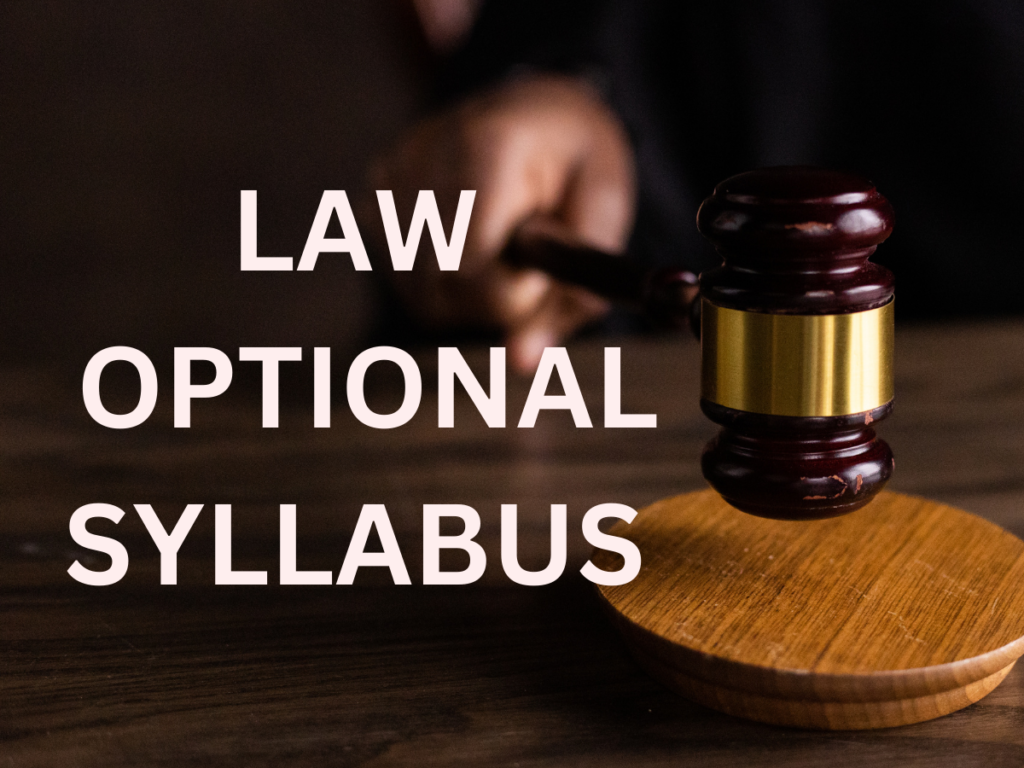Law Optional Syllabus
Choosing Law as an optional subject for the UPSC Civil Services Exam can benefit aspirants with a law background or those interested in India’s legal and constitutional framework. This post covers the complete syllabus for Law Optional for both Paper I and Paper II.
Paper I: Law Optional Syllabus
-
Constitutional and Administrative Law:
- Constitution and Constitutionalism: The distinctive features of the Constitution.
- Fundamental Rights—Public interest litigation; Legal Aid; Legal Services Authority.
- Relationship between Fundamental Rights, Directive Principles, and Fundamental Duties.
- Constitutional Position of the President and relation with the Council of Ministers.
- Governor and his powers.
- Supreme Court and the High Courts:
- Appointments and transfers.
- Powers, functions, and jurisdiction.
- Centre, States, and local bodies:
- Distribution of legislative powers between the Union and the States.
- Local Bodies.
- Administrative relationship among Union, State, and Local Bodies.
- Eminent domain—State property, common property, community property.
- Legislative powers, privileges, and immunities.
- Services under the Union and the States:
- Recruitment and conditions of services; Constitutional safeguards; Administrative tribunals.
- Union Public Service Commission and State Public Service Commissions—Powers and functions.
- Election Commission—Powers and functions.
- Emergency provisions.
- Amendment of the Constitution.
- Principles of Natural Justice—Emerging trends and judicial approach.
- Delegated legislation and its constitutionality.
- Separation of powers and constitutional governance.
- Judicial review of administrative action.
- Ombudsman: Lokayukta, Lokpal, etc.
-
International Law:
- Nature and Definition of International Law.
- Relationship between International Law and Municipal Law.
- State Recognition and State Succession.
- Law of the Sea: Inland Waters, Territorial Sea, Contiguous Zone, Continental Shelf, Exclusive Economic Zone, and High Seas.
- Individuals: Nationality, statelessness; Human Rights and procedures available for their enforcement.
- Territorial jurisdiction of States, Extradition, and Asylum.
- Treaties: Formation, application, termination, and reservation.
- United Nations: Its principal organs, powers, and functions, and reforms.
- Peaceful settlement of disputes—different modes.
- Lawful recourse to force: aggression, self-defense, intervention.
- Fundamental principles of international humanitarian law—International conventions and contemporary developments.
- Legality of the use of nuclear weapons; ban on testing of nuclear weapons; Nuclear Non-Proliferation Treaty, CTBT.
- International Terrorism, State-sponsored terrorism, Hijacking, International Criminal Court.
- New International Economic Order and Monetary Law: WTO, TRIPS, GATT, IMF, World Bank.
- Protection and Improvement of the Human Environment: International efforts.
Paper II: Law Optional Syllabus
-
Law of Crimes:
- General principles of Criminal liability : mens rea and actus reus, mens rea in statutory offences.
- Kinds of punishment and emerging trends as to abolition of capital punishment.
- Preparations and criminal attempt.
- General exceptions.
- Joint and constructive liability.
- Abetment.
- Criminal conspiracy.
- Offences against the State.
- Offences against public tranquility.
- Offences against human body.
- Offences against property.
- Offences against women.
- Defamation.
- Prevention of Corruption Act, 1988.
- Protection of Civil Rights Act, 1955 and subsequent legislative developments.
- Plea bargaining.
-
Law of Torts
- Nature and definition.
- Liability based upon fault and strict liability; Absolute liability.
- Vicarious liability including State Liability.
- General defences.
- Joint tort fessors.
- Remedies.
- Negligence.
- Defamation.
- Nuisance.
- Conspiracy.
- False imprisonment.
- Malicious prosecution.
- Consumer Protection Act, 1986.
-
Law of Contracts and Mercantile Law:
- Nature and formation of contract/E-contract.
- Factors vitiating free consent.
- Void, voidable, illegal and unenforceable agreements.
- Performance and discharge of contracts.
- Quasi-contracts.
- Consequences of breach of contract.
- Contract of indemnity, guarantee and insurance.
- Contract of agency.
- Sale of goods and hire purchase.
- Formation and dissolution of partnership.
- Negotiable Instruments Act, 1881.
- Arbitration and Conciliation Act, 1996.
- Standard form contracts.
-
Contemporary Legal Developments:
- Public Interest Litigation.
- Intellectual property rights—Concept, types/prospects.
- Information Technology Law including Cyber Laws—Concept, purpose/prospects.
- Competition Law—Concept, purpose/prospects.
- Alternate Dispute Resolution—Concept, types/prospects.
- Major statutes concerning environmental law.
- Right to Information Act.
- Trial by media.
